M4 Unit 1 I haven't done much exercise since I got my computer.知识点和语法课件
文档属性
| 名称 | M4 Unit 1 I haven't done much exercise since I got my computer.知识点和语法课件 |

|
|
| 格式 | zip | ||
| 文件大小 | 79.9KB | ||
| 资源类型 | 试卷 | ||
| 版本资源 | 外研版 | ||
| 科目 | 英语 | ||
| 更新时间 | 2021-10-08 11:53:48 | ||
图片预览

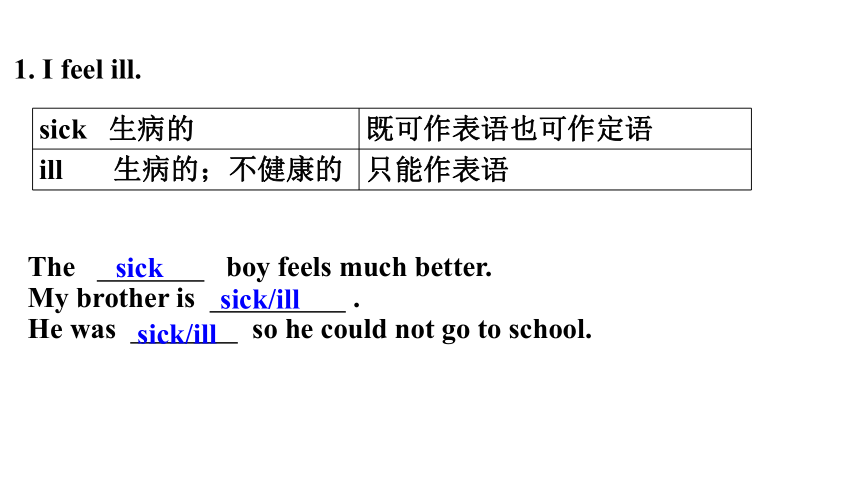
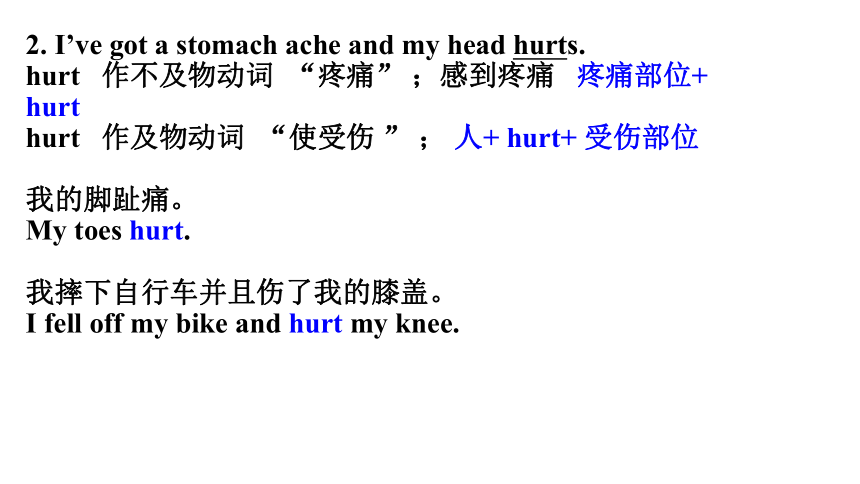
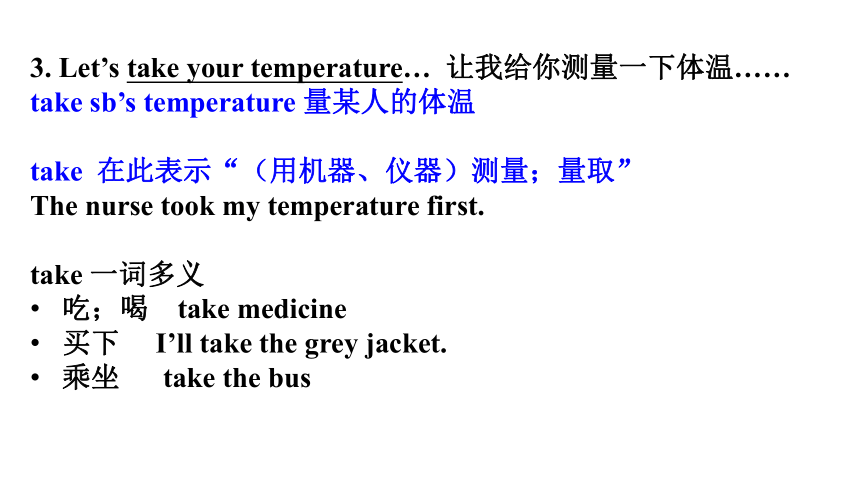

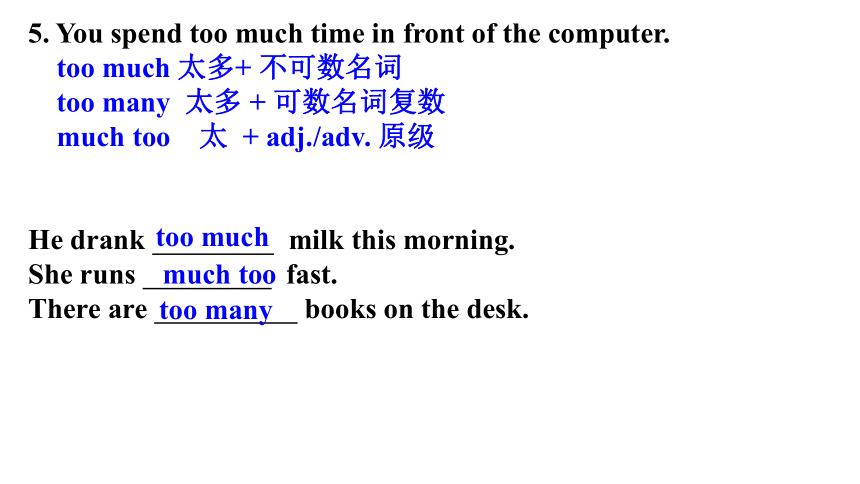
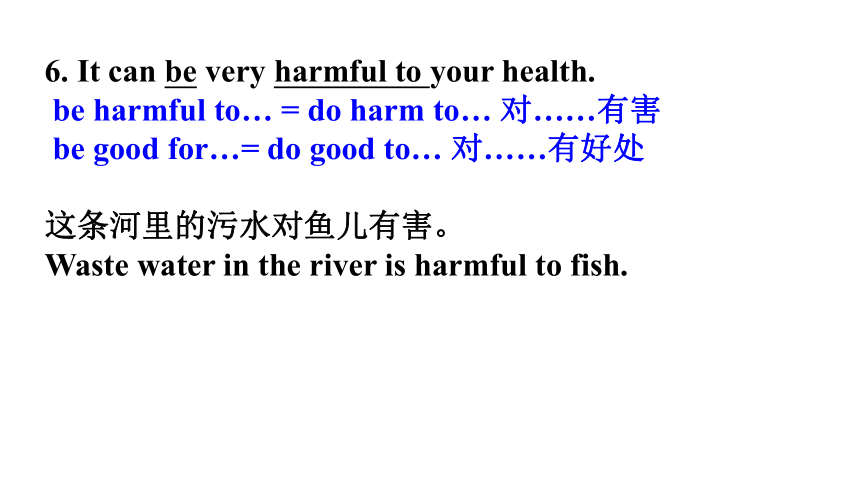
文档简介
(共18张PPT)
M4U1
知识点
1.
I
feel
ill.
sick
生病的
既可作表语也可作定语
ill
生病的;不健康的
只能作表语
The
boy
feels
much
better.
My
brother
is
.
He
was
so
he
could
not
go
to
school.
sick
sick/ill
sick/ill
2.
I’ve
got
a
stomach
ache
and
my
head
hurts.
hurt
作不及物动词
“疼痛”
;感到疼痛
疼痛部位+
hurt
hurt
作及物动词
“使受伤
”
;
人+
hurt+
受伤部位
我的脚趾痛。
My
toes
hurt.
我摔下自行车并且伤了我的膝盖。
I
fell
off
my
bike
and
hurt
my
knee.
3.
Let’s
take
your
temperature…
让我给你测量一下体温……
take
sb’s
temperature
量某人的体温
take
在此表示“(用机器、仪器)测量;量取”
The
nurse
took
my
temperature
first.
take
一词多义
吃;喝
take
medicine
买下
I’ll
take
the
grey
jacket.
乘坐
take
the
bus
4.
Do
you
do
any
exercise?
exercise
n.
锻炼,运动
不可数
do
exercise
锻炼;做运动=
take
exercise
n.
练习;习题;操练
可数
--s
The
students
do
eye
exercises
twice
a
day.
exercise
v.
操练;训练;锻炼
exercising
exercised
exercised
If
you
don’t
exercise,
you’ll
be
fat.
5.
You
spend
too
much
time
in
front
of
the
computer.
too
much
太多+
不可数名词
too
many
太多
+
可数名词复数
much
too
太
+
adj./adv.
原级
He
drank
milk
this
morning.
She
runs
fast.
There
are
books
on
the
desk.
too
much
much
too
too
many
6.
It
can
be
very
harmful
to
your
health.
be
harmful
to…
=
do
harm
to…
对……有害
be
good
for…=
do
good
to…
对……有好处
这条河里的污水对鱼儿有害。
Waste
water
in
the
river
is
harmful
to
fish.
7.
And
I’ll
give
you
some
medicine.
Take
it
three
times
a
day.
time
n.
次数;倍数
可数
--
times
three
times
a
day
一天三次
表频度的词组,类似的还有
twice
a
month;
once
a
week,
four
times
a
year
,
对频度副词或词组进行提问用how
often
多久一次
--
How
often
do
you
eat
fast
food?
--
Two
times
a
week.
8.
祈使句巨型
(1)(Don’t)
实义动词/be+
…
Be
quiet.
Don’t
east
junk
food.
(2)
Never+
动词原形+…
Never
do
it
again.
Never
give
up.
(3)
No
doing…
No
smoking/parking/
fishing.
(4)
Let’s
(not)
do
…
Let’s
(not)
go
out.
M4U1
语法
现在完成时(3)
一、
for、since在现在完成时中的应用
在表示行为或状态从过去一直延续到现在时,
通常要与表示一段时间的时间状语连用,这类状语通常由for
或者since
引导。
for
后接一段时间,而since后多接时间点。
He
has
been
away
for
two
years.
He
has
been
an
English
teacher
since
last
year.
since
的具体用法
since
conj.&
prep.
自……以来,常与现在完成时连用。
since
(conj.)
+
过去的某个时间点(如具体的年、月、日或钟点等。)
He
has
lived
here
since
1999.
since
(prep)+
时间段+
ago
Mr
Smith
has
been
in
China
since
five
years
ago.
since
(conj.)
引导时间状语从句,从句用一般过去时,
主句用现在完成时。
Where
have
you
been
since
I
last
saw
you?
for
的具体用法
for+
时间段
表示某事持续多长时间,多与现在完成时连用,动词须用延续性动词;对“for+
时间段
”提问
用how
long
多久
He
has
been
in
London
for
about
10
years.
How
long
has
he
been
in
London?
since
后接时间点
表示“从某时开始”
都可与现在完成时连用
for
后接时间段
表示“已经多长时间了”
I
have
been
here
ten
o’clock
this
morning.
She
ahs
been
waiting
for
the
manager
two
hours.
since
for
since
和for的辨析
注意:
在表示某一行为或状态持续多长时间时,根据种植时间的不同,
需要使用不同的状态。如:
I
stayed
in
the
hotel
for
a
week
last
summer.
I
have
stayed
in
the
hotel
for
a
week
now.
I
will
stay
in
the
hotel
for
a
week
next
month.
She
sleeps
for
eight
hours
every
day.
练习:用since和for填空
_______
two
years
2)
_______
two
years
ago
3)
_______
last
month
4)
______
1999
5)
_______
yesterday
6)
_______
4
o’clock
7)
_______
4
hours
8)
_______
an
hour
ago
9)
_______
we
were
children
10)
______
she
left
here
for
since
since
since
since
since
for
since
since
since
1.
He
has
lived
in
Nanjing
________
the
year
before
last.
2.
I’ve
known
him
__________
we
were
children.
3.
Our
teacher
has
studied
Japanese
_________
three
years.
4.
She
has
been
away
from
the
city
___________
about
ten
years.
5.
It’s
about
ten
years
__________
she
left
the
city.
since
since
for
for
since
翻译
自从昨天起,我一直头痛。
我已经生病三天了。
自从他五岁时,他一直住在南京。
自从2000年起,她一直是一名医生。
I
have
had
a
headache
since
yesterday.
I
have
been
ill
for
three
days.
He
has
lived
in
Nanjing
since
he
was
five.
She
has
been
a
doctor
since
2000.
M4U1
知识点
1.
I
feel
ill.
sick
生病的
既可作表语也可作定语
ill
生病的;不健康的
只能作表语
The
boy
feels
much
better.
My
brother
is
.
He
was
so
he
could
not
go
to
school.
sick
sick/ill
sick/ill
2.
I’ve
got
a
stomach
ache
and
my
head
hurts.
hurt
作不及物动词
“疼痛”
;感到疼痛
疼痛部位+
hurt
hurt
作及物动词
“使受伤
”
;
人+
hurt+
受伤部位
我的脚趾痛。
My
toes
hurt.
我摔下自行车并且伤了我的膝盖。
I
fell
off
my
bike
and
hurt
my
knee.
3.
Let’s
take
your
temperature…
让我给你测量一下体温……
take
sb’s
temperature
量某人的体温
take
在此表示“(用机器、仪器)测量;量取”
The
nurse
took
my
temperature
first.
take
一词多义
吃;喝
take
medicine
买下
I’ll
take
the
grey
jacket.
乘坐
take
the
bus
4.
Do
you
do
any
exercise?
exercise
n.
锻炼,运动
不可数
do
exercise
锻炼;做运动=
take
exercise
n.
练习;习题;操练
可数
--s
The
students
do
eye
exercises
twice
a
day.
exercise
v.
操练;训练;锻炼
exercising
exercised
exercised
If
you
don’t
exercise,
you’ll
be
fat.
5.
You
spend
too
much
time
in
front
of
the
computer.
too
much
太多+
不可数名词
too
many
太多
+
可数名词复数
much
too
太
+
adj./adv.
原级
He
drank
milk
this
morning.
She
runs
fast.
There
are
books
on
the
desk.
too
much
much
too
too
many
6.
It
can
be
very
harmful
to
your
health.
be
harmful
to…
=
do
harm
to…
对……有害
be
good
for…=
do
good
to…
对……有好处
这条河里的污水对鱼儿有害。
Waste
water
in
the
river
is
harmful
to
fish.
7.
And
I’ll
give
you
some
medicine.
Take
it
three
times
a
day.
time
n.
次数;倍数
可数
--
times
three
times
a
day
一天三次
表频度的词组,类似的还有
twice
a
month;
once
a
week,
four
times
a
year
,
对频度副词或词组进行提问用how
often
多久一次
--
How
often
do
you
eat
fast
food?
--
Two
times
a
week.
8.
祈使句巨型
(1)(Don’t)
实义动词/be+
…
Be
quiet.
Don’t
east
junk
food.
(2)
Never+
动词原形+…
Never
do
it
again.
Never
give
up.
(3)
No
doing…
No
smoking/parking/
fishing.
(4)
Let’s
(not)
do
…
Let’s
(not)
go
out.
M4U1
语法
现在完成时(3)
一、
for、since在现在完成时中的应用
在表示行为或状态从过去一直延续到现在时,
通常要与表示一段时间的时间状语连用,这类状语通常由for
或者since
引导。
for
后接一段时间,而since后多接时间点。
He
has
been
away
for
two
years.
He
has
been
an
English
teacher
since
last
year.
since
的具体用法
since
conj.&
prep.
自……以来,常与现在完成时连用。
since
(conj.)
+
过去的某个时间点(如具体的年、月、日或钟点等。)
He
has
lived
here
since
1999.
since
(prep)+
时间段+
ago
Mr
Smith
has
been
in
China
since
five
years
ago.
since
(conj.)
引导时间状语从句,从句用一般过去时,
主句用现在完成时。
Where
have
you
been
since
I
last
saw
you?
for
的具体用法
for+
时间段
表示某事持续多长时间,多与现在完成时连用,动词须用延续性动词;对“for+
时间段
”提问
用how
long
多久
He
has
been
in
London
for
about
10
years.
How
long
has
he
been
in
London?
since
后接时间点
表示“从某时开始”
都可与现在完成时连用
for
后接时间段
表示“已经多长时间了”
I
have
been
here
ten
o’clock
this
morning.
She
ahs
been
waiting
for
the
manager
two
hours.
since
for
since
和for的辨析
注意:
在表示某一行为或状态持续多长时间时,根据种植时间的不同,
需要使用不同的状态。如:
I
stayed
in
the
hotel
for
a
week
last
summer.
I
have
stayed
in
the
hotel
for
a
week
now.
I
will
stay
in
the
hotel
for
a
week
next
month.
She
sleeps
for
eight
hours
every
day.
练习:用since和for填空
_______
two
years
2)
_______
two
years
ago
3)
_______
last
month
4)
______
1999
5)
_______
yesterday
6)
_______
4
o’clock
7)
_______
4
hours
8)
_______
an
hour
ago
9)
_______
we
were
children
10)
______
she
left
here
for
since
since
since
since
since
for
since
since
since
1.
He
has
lived
in
Nanjing
________
the
year
before
last.
2.
I’ve
known
him
__________
we
were
children.
3.
Our
teacher
has
studied
Japanese
_________
three
years.
4.
She
has
been
away
from
the
city
___________
about
ten
years.
5.
It’s
about
ten
years
__________
she
left
the
city.
since
since
for
for
since
翻译
自从昨天起,我一直头痛。
我已经生病三天了。
自从他五岁时,他一直住在南京。
自从2000年起,她一直是一名医生。
I
have
had
a
headache
since
yesterday.
I
have
been
ill
for
three
days.
He
has
lived
in
Nanjing
since
he
was
five.
She
has
been
a
doctor
since
2000.
同课章节目录
- Module 1 Feelings and impressions
- Unit 1 It smells delicious.
- Unit 2 I feel nervous when I speak Chinese .
- Unit 3 Language in use
- Module 2 Experiences
- Unit 1 I've also entered lots of speaking competi
- Unit 2 They have seen the Pyramids.
- Unit 3 Language in use
- Module 3 Journey to space
- Unit 1 Has it arrived yet?
- Unit 2 We have not found life on any other planet
- Unit 3 Language in use
- Module 4 Seeing the docto
- Unit 1 I haven't done much exercise since I got m
- Unit 2 We have played football for a year now
- Unit 3 Language in use
- Module 5 Cartoons
- Unit 1 It's time to watch a cartoon.
- Unit 2 Tintin has been popular for over eighty yea
- Unit 3 Language in use
- Revision module A
- Module 6 Hobbies
- Unit 1 Do you collect anything ?
- Unit 2 Hobbies can make you grow as a person.
- Unit 3 Language in use
- Module 7 Summer in Los Angeles
- Unit 1 Please write to me and send me some photos
- Unit 2 Fill out a form and come to learn English
- Unit 3 Language in use
- Module 8 Time off
- Unit 1 I can hardly believe we are in the city ce
- Unit 2 We thought somebody was moving about
- Unit 3 Language in use
- Module 9 Friendship
- Unit 1 Could I ask if you've mentioned this to he
- Unit 2 I believe that the world is what you think
- Unit 3 Language in use
- Module 10 On the radio
- Unit 1 I hope that you can join us one day
- Unit 2 It seemed that they were speaking to me in
- Unit 3 Language in use
- Revision module B
